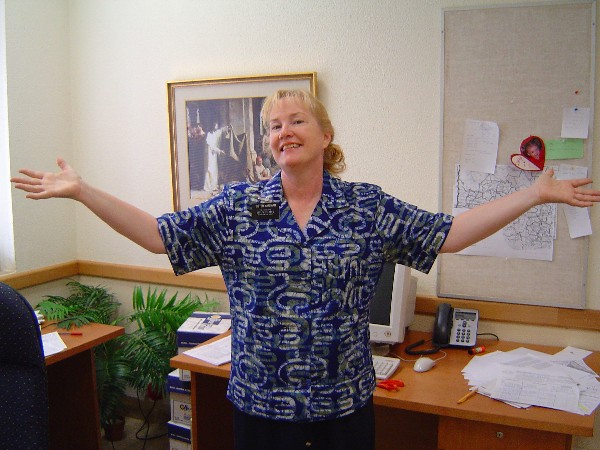
Sister Markham shows off her new batik blouse
"I'm becoming Ghanaian!"

Sister Markham shows off her new batik blouse
"I'm becoming Ghanaian!"
| Sister Markham has resisted the common missionary tendency to buy African clothing, saying, "It just isn't me." Even her brother Mike in New Mexico is proudly wearing a Kente cloth tie she sent to him. Then she discovered batik fabric and her resolve started to weaken. She went to a batik manufacturing business and succumbed to a piece of fabric which she had made into a western style blouse. The first time she wore it she was bowled over by all the compliments she received, some from fellow obruni's , but mostly from Ghanaians. |

|
| Uncle Mike in Kente Cloth Tie |
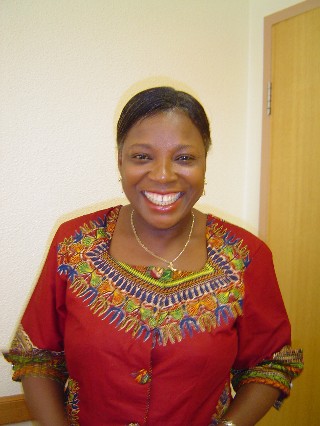
Emelia Ahadjie, a real Ghanaian
Mouseover to compare Sister Markham
She is making some progress!
To learn more about manufacturing batik fabric in Ghana
and see batik art, click the button below.

|
Abigail, shown here with Elder Markham and her daughter Hidia, owns two shops that sell African crafts including wood carvings and batik art. She offers fixed, low prices to LDS missionaries, so we go there frequently. On this day we found several nice souvenirs. After giving Abigail all his money, Elder Markham asked if she would adopt him! She said yes, so we took this new family photo. |
| Abigail, Elder Markham and Hidia |

Amina, the Noble Banana Lady
Amina sells the best bananas in all of Accra. The discussion when this picture was taken had to do with her NOT wanting to sell Elder Markham bananas because the day's supply was not up to her standard!! He had to argue to get a few to tide him over until the next time he went shopping there. She gave him 12 bananas for 70 cents--he paid her a buck and she tried to argue. How many poor street vendors do you know who take that level of pride in their work? She deserves true respect! Consider what the world would be like if we were all like her.
To learn more about some typical jobs in Ghana,
click the button below.
The (cooler) rainy season is here!
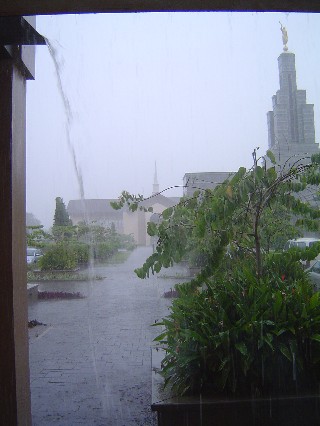
The Rainy Season |
Although Accra is slightly north of the equator, the hottest months are March and April. The major rainy season which is cooler (lows at night in the 70s) follows in May and June. July and August remain relatively cool. There is a minor rainy season in September and October, then the weather is drier and hotter for November and December. January is often cooled by the Harmattan dust. February sees temperatures going up again. In a recent class at church, a quote was read that compared the resurrection to the transition from Winter to Spring. The quote was in English, but the class discussion was in Twi. The instructor stopped, looked at Elder Markham, and said, "How many seasons are there?" It is so easy to forget what people don't know! Of course that goes both ways. One of the blessings of living in a different culture is learning what you didn't know that you don't know. |
Even if it isn't called Spring, the rainy season moisture
brings out a new array of beautiful flowers and flowering trees.
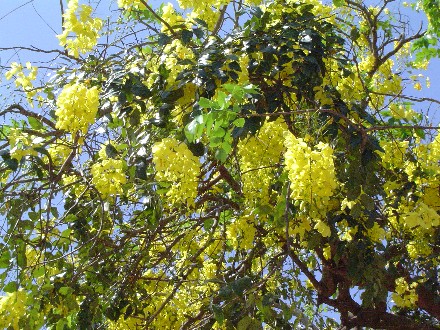
Yellow flowers cover a tree
Sister Markham's favorite flower this month.
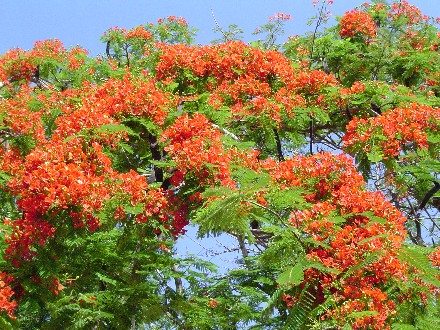
Flame Tree in Bloom
To enjoy more flowers that Sister Markham found this month,
click on the button below.
In addition to new flowers,
this month BYU students arrived for study and service work.
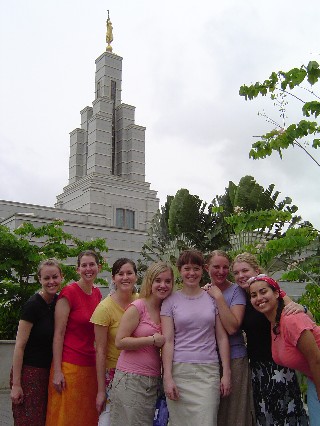
|
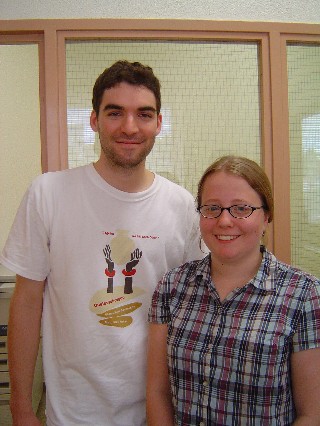
|
|
About 20 BYU students arrived for a "semester abroad" program in Ghana. They each have a specific project related to health or living conditions to work on for 3 months. |
They are staying in a Methodist housing compound in Kumasi and will do their work in Ashanti villages near Kumasi. |

Nursing Students from BYU with Patriarch Johnson
Several nursing students from BYU also arrived in Ghana recently. They will stay in Accra for six weeks to do humanitarian service in the area of women's health. The student on the far right is Ann Reichman, the grand-daughter-in-law of our Ward Relief Society President in Provo.
Our interaction with the Saints and people of West Africa remains
the highlight of our mission experience here.
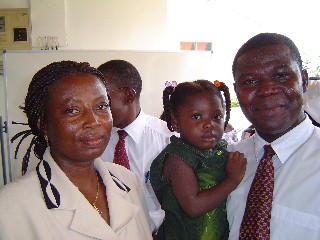
|
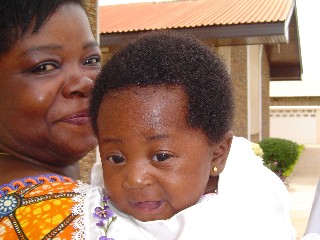
|
|
This is Bishop Bamfo with his wife and daughter. |
Just like home---here is a Bishop's wife outside a meeting trying to settle down her infant daughter. |
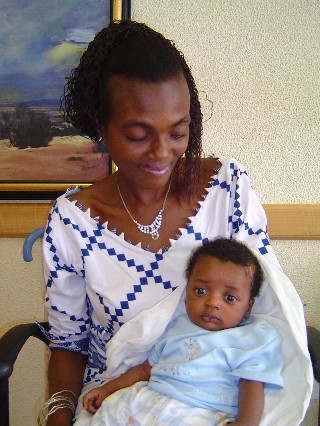
|
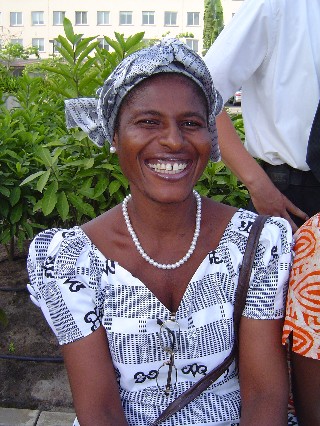
|
|
The vegetable lady Mary has returned after a few weeks off to have Jason. |
Rosemary, a recent convert, came to temple to do baptisms for the dead. |
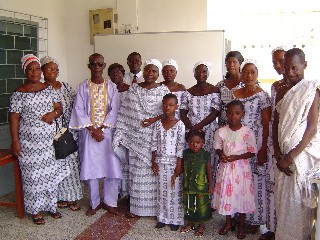
Family of a deceased member |
At a Sunday service we attended recently, the family of a deceased member, Brother Churchill, was in attendence. The funeral had been held the previous day and out of appreciation for the Church's support of the family, as many as could attended the meetings. Most are not members of the Church. Sister Markham loves the white and black fabric that is used for special occasions. |
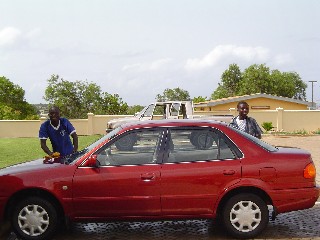
|
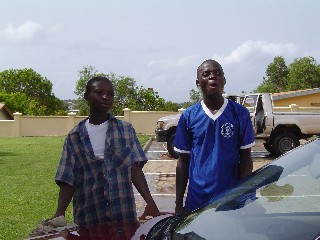
|
|
We traveled to a church building early one Saturday to do a closeout audit of an old bank account. Members come to the buildings on Saturday mornings to clean. |
When we returned to the parking lot, two young men were just finishing washing our car. We hadn't asked for this; they were just serving. Nice touch! |
We love the music in West Africa.
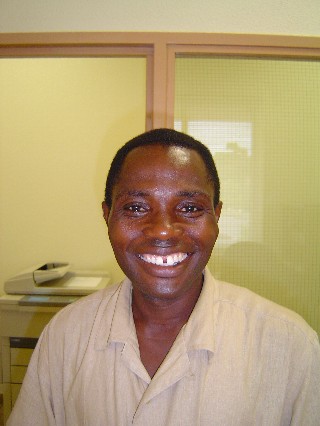
|
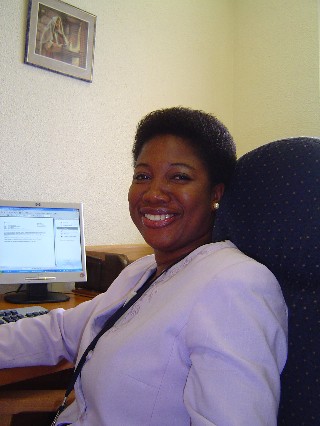
|
|
Brigham Johnson (the patriarch's son) is a Stake Music Chairman. He has memorized the entire hymn book. |
Jessie Assogba, CES Director's assistant, asked, "What do you people do in Salt Lake?" |
Music is one of our favorite things anywhere, but here in Africa it’s especially fun. It was obvious from the beginning that the Ghanaians have a wonderful ability to memorize. While they can use a hymn book, most don’t need to. Many people have the hymns memorized, including the hymn numbers and their own harmony line. Recently at a stake conference the organist was playing a hymn for prelude Sister Markham couldn’t identify. She knew the hymn, but couldn’t get its words to come to mind. So, she turned to the Ghanaian sister next to her and asked what the hymn was. There was no doubt that she would know. Her response? Without hesitation she said, “Number 218.”
Last month we visited a ward where we sang two hymns Sister Markham had never even heard before. On Monday mornings, the employees and missionaries who work in the Area Office Building meet for a weekly Monday Devotional. Sister Markham arrived early to play these two hymns on the keyboard. She began playing the first hymn, #17, “Awake, Ye Saints of God, Awake!” Felicia, also there early, began singing along without a book. Sister Markham stopped and commented that Felicia knew the hymn. Felicia replied that it was one of her favorites. Sister Markham told her that she'd just heard two hymns for the first time, and the next hymn was going to be another unfamiliar hymn. After finishing #17, Sister Markham began playing #118, “Ye Simple Souls Who Stray.” Jessie, also there early, was astonished that Sister Markham didn’t know that hymn. She indignantly said, “What do you people DO in Salt Lake?” We think that’s a really good question!
A common pastime here is to memorize and sing hymns as families. Brigham Johnson was named after Brigham Young by his father, Joseph William Billy Johnson, before the Church was officially established in West Africa. Brigham had the old blue hymn book completely memorized, but when the green hymn book came out in 1985, he immediately began memorizing the new hymns and relearning all the hymn numbers. Brigham would also like to be able to play every hymn, but he works as a handyman/repairman during the day. His home does not have electricity, so while he can purchase batteries for his keyboard so he can practice at night, he does not have lights to read the music. He showed us how Ghanaians learn hymns without a keyboard. All Ghanaians learn the solfa system in school. Solfa, or Solfeggio, is using words to name a C Major scale instead of letters. Instead of C, D, E, they use Do, Re, Mi. Ghanaians all know the intervals between sol and ti, for example, or mi and re. The choir master will ‘transcribe’ the musical notes to the solfa system, and then a Ghanaian can easily read the music for the hymn and sing it. Sister Armstrong and Sister Markham work with a choir comprised of workers in the office building, and they’ve watched it. It’s impressive. Sister Markham can do anything musically with a keyboard or piano, but take it away – and she is helpless. Not Ghanaians. It’s like being able to see in the dark. Or, more accurately, sing in the dark.
Missionary life is not the easiest thing we've ever done,
but doing it with such amazing associates makes it good!
Please click on the button below to see missionary photos.
Elder Dale and Sister Lea Huff are two of our friends who arrived just after the New Year. Sister Huff belonged to a book club in Centerville, Utah, that Sister Markham's sister attends. The book club happened to be meeting just after the Huffs got their mission call. We learned about them coming to Ghana and were able to communicate through email to give them some tips. Elder Huff and Elder Markham graduated from the same high school. One graduated 14 years before the other one. Guess who is older--hint: activity level is not a good indicator of age! These are people who call problems and unknown challenges adventures. Their motto is: Every day is a new adventure.
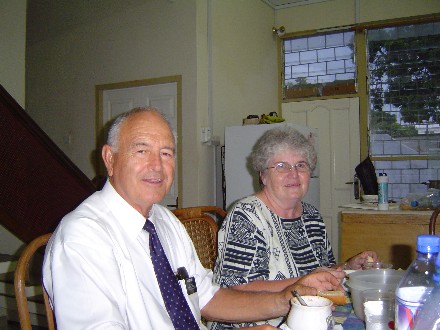
Dale and Lea Huff
Click the button below to learn a little about the
adventures of Elder and Sister Huff in Ghana
(This page has a lot of pictures, so it takes a while to download.
It is well worth the wait.)
When we looked through our pictures this month,
there was only one interesting sign/shop photo.
So, by acclaimation, here is the monthly winner.

Another reminder of what is NOT common in Ghana.
We also had only two animal pictures.

|

|
| Gecko | Monkey |
But we took a one hour cruise on the Volta River
that provided some wonderful nature photograpy.
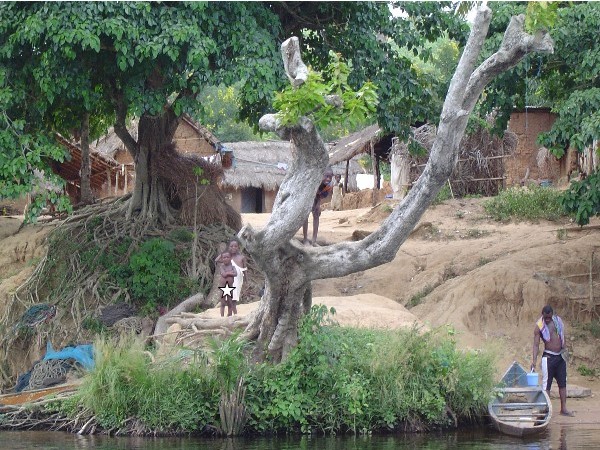
The Volta River provides this village with food and transportation;
water for washing, cooking and drinking;
and entertainment.
Watching obruni tourists being inclued in the last item.
Click the button below to see more scenery from the Volta River
And the big news from home: Sammie and Melissa are engaged!

Five year old Matt said it best,
"I am going to have a new aunt."
See the
Sammie and Melissa page
for details.
Top of page
Click to return to start of this update.
Click here to return to the mission page
Click here to go to the Ben and Julie Markham Family Home Page